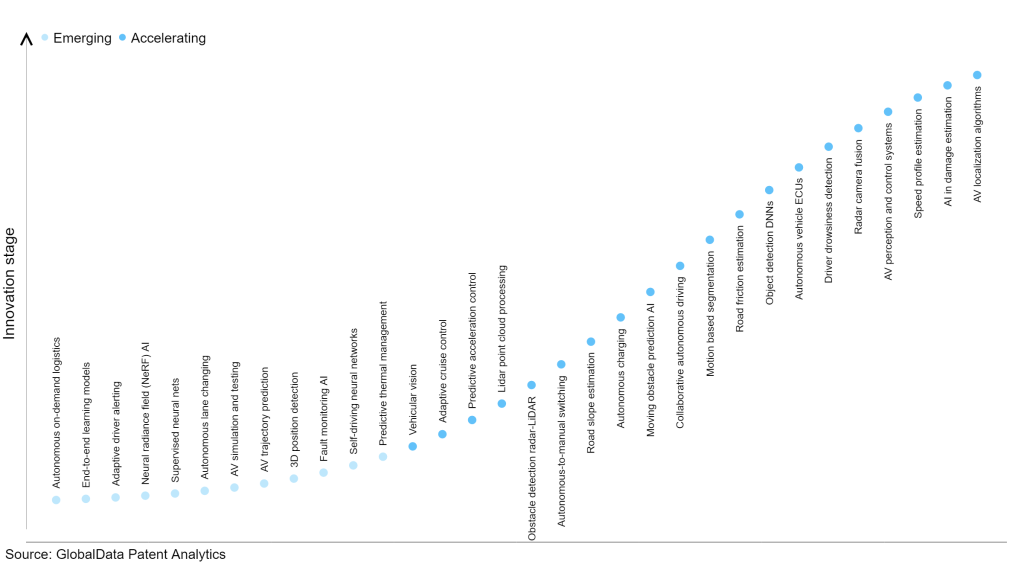The automotive industry continues to be a hotbed of patent innovation. Activity is driven by by growing importance of safety, cost, performance, and convenience, and growing importance of technologies such as artificial intelligence (AI), machine learning, digital map, and human machine interaction. In the last three years alone, there have been over 1.7 million patents filed and granted in the automotive industry, according to GlobalData’s report on Artificial intelligence in automotive: predictive acceleration control. Buy the report here.
However, not all innovations are equal and nor do they follow a constant upward trend. Instead, their evolution takes the form of an S-shaped curve that reflects their typical lifecycle from early emergence to accelerating adoption, before finally stabilizing and reaching maturity.
Identifying where a particular innovation is on this journey, especially those that are in the emerging and accelerating stages, is essential for understanding their current level of adoption and the likely future trajectory and impact they will have.
300+ innovations will shape the automotive industry
According to GlobalData’s Technology Foresights, which plots the S-curve for the automotive industry using innovation intensity models built on over one million patents, there are 300+ innovation areas that will shape the future of the industry.
Within the emerging innovation stage, autonomous on-demand logistics, end-to-end learning models, and adaptive driver alerting are disruptive technologies that are in the early stages of application and should be tracked closely. Vehicular vision, adaptive cruise control, and predictive acceleration control are some of the accelerating innovation areas, where adoption has been steadily increasing.
Innovation S-curve for artificial intelligence in the automotive industry

Predictive acceleration control is a key innovation area in artificial intelligence
Predictive acceleration control refers to a set of methods and algorithms used to optimize the performance, efficiency and safety of vehicles. The technology utilizes data gathered from numerous sources, including weather conditions, the vehicle configuration, and driving history, to provide predictive analysis and anticipate future energy demands. By doing so, predictive acceleration control can improve driver experience and help balance energy use.
GlobalData’s analysis also uncovers the companies at the forefront of each innovation area and assesses the potential reach and impact of their patenting activity across different applications and geographies. According to GlobalData, there are 30+ companies, spanning technology vendors, established automotive companies, and up-and-coming start-ups engaged in the development and application of predictive acceleration control.
Key players in predictive acceleration control – a disruptive innovation in the automotive industry
‘Application diversity’ measures the number of applications identified for each patent. It broadly splits companies into either ‘niche’ or ‘diversified’ innovators.
‘Geographic reach’ refers to the number of countries each patent is registered in. It reflects the breadth of geographic application intended, ranging from ‘global’ to ‘local’.
Patent volumes related to predictive acceleration control
Source: GlobalData Patent Analytics
Toyota Motor is one of the leading patent filers in predictive acceleration control For the automotive industry Toyota has received a patent for a predictive acceleration control system, which uses sensors to predict vehicle acceleration based on factors such as speed, road conditions, and driver inputs. This technology could enhance fuel efficiency, safety, and performance in vehicles. Hyundai Motor and Kia are some of the other key patent filers in predictive acceleration control.
In terms of application diversity, Superpedestrian leads the pack, while Nio and Sandvik stood in the second and third positions, respectively. By means of geographic reach, Sumitomo Heavy Industries held the top position, followed by Nio and Komatsu.
To further understand the key themes and technologies disrupting the automotive industry, access GlobalData’s latest thematic research report on Artificial Intelligence (AI) in Automotive.
Premium Insights
From
The gold standard of business intelligence.
Blending expert knowledge with cutting-edge technology, GlobalData’s unrivalled proprietary data will enable you to decode what’s happening in your market. You can make better informed decisions and gain a future-proof advantage over your competitors.



